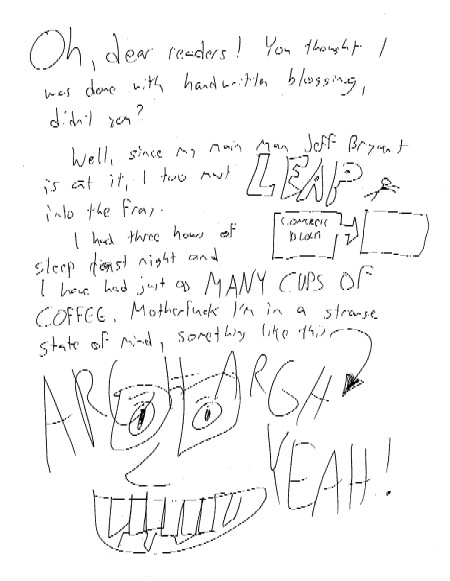[EDITOR’S NOTE: Our roundtable discussion of T.C. Boyle’s Talk Talk continues, with Edward Champion jumping into the fray and Dan Wickett offering further thoughts. Part One can be accessed here. Here’s Part Three and Part Four]
Ed writes:
Talk Talk reminded me very much of Anthony Burgess’s spy thriller novel, Tremor of Intent. Like Burgess, Boyle is a literary author approaching a “lowbrow” genre with the intention of skewering it, only to learn midway through the novel that he must embrace its machinations instead of mocking them. I don’t know about you folks (and perhaps some of the more genre-blind participants might want to offer a few words here), but I find it extremely interesting when this happens. Updike ventured into these waters a bit with Terrorist, with mixed but by no means completely terrible results. And I’m extremely curious about John Banville’s upcoming mystery novel (under the pseudonym Benjamin Black). This is a side issue, but what do you think accounts for this recent rise of literary authors (and particularly Boyle) flirting with genre? Personally, I don’t believe that this is entirely a question of writers wanting to draw more money and awareness.
My feeling is that Boyle, despite a lumpy midsection, eventually figured out a way to fuse his penchant for troubled humans (and certainly Peck Wilson comes across as a farcical foe) with a gripping cross-country thriller. I could quibble over the dubious economics that permit Dana and Bridger, both of them unemployed, with scant savings and with tarnished credit histories, to chase Peck Wilson. Nevertheless, I found myself drawn to the vengeful rage, both justified and petty, common to all of the characters in the book. There was something tragicomic about the police and the courts being useless and unsympathetic in exacting justice, forcing the characters to operate self-sufficiently in a state of anarchy. But here, there are wry parallels of self-entitlement that Boyle draws between Dana and Peck. Peck, of course, is concerned primarily for his self-interest, arising from past circumstances where he has been humiliated and believing that he is entitled to luxury condos, fine restaurants, and the like. He struck me as a sad but strangely amusing character. But Dana is also solipsistic about her need for personal justice and insists on Bridger accompanying her, berating him for having the temerity to fail or for being a flawed human. I should note that this is Boyle’s first novel set in the present since The Tortilla Curtain and, like that novel, Talk Talk also explores issues of shifting ideologies and personal contempt, with Boyle hoping to take on his issue from two perspectives. Did you folks feel that these two characters offered a sufficient comparison and contrast on these points? Did Boyle’s points about the many shades of self-entitlement work for you? And I’m also curious if you folks felt that Boyle went a little over-the-top to make his points. I didn’t mind this flamboyance (with Boyle, it often comes with the territory), but given the more nuanced feel of Drop City and The Inner Circle, it was a bit eye-popping to see him return to such a wild narrative.
I also wanted to address Dan’s interesting observation that Boyle sees human animals as part of the food chain, at the mercy of environmental vagaries. But if the author is the one responsible for plotting the world that the characters inhabit, one can draw a corollary between this and another of Boyle’s qualities: a tendency to play cruel god, flinging his characters into horrible fates — sometimes of their own making, sometimes because of the world’s circumstances. This extends to the merciless Alaskan environment in Drop City or the coyotes who eat Delaney Mossbacher’s lapdogs in The Tortilla Curtain.
To weave this question of cruelty into Talk Talk, both Dana and Bridger are very much victims of the environment they live in. But I think that the environmental struggle this time around arises more from personal decisions: both theirs and others. It couldn’t be any clearer with the amusing metaphor of Bridger toiling at a job in which he creates artificial environments for a visual effects company. But there is also a dog-eat-dog feel, perhaps a sly reference to the rugged Western frontier, in which individuals are at the mercy of other individuals’ vagaries. Rather interestingly, a good deal of the oppressive forces here are employers. Dr. Koch is particularly unsympathetic to Dana’s false arrest. Radko is a little more helpful, but, with him, it’s about the bottom line of getting a movie done. I suspect that Boyle’s concern here resides more with how capitalism or some of society’s undercurrents enslave identity, but what do you folks think?
I slightly disagree with Dan about the humor. I thought the humor wasn’t so much insider in nature, but that it had much to do with these characters being unable to get a feel for the environments they’re trying to negotiate. Bridger, for example, can’t even recognize the country that Radko is from and complains when he can simply ask Radko this question. And then there’s Peck resorting to the hard prison look, believing that he can exist on intimidation alone. And I was also amused by Boyle’s sly suggestion that operating in the world isn’t so much about clinging to one’s job or credit cards, but about breaking out of the routines and actually getting to know people. Bridger, for example, learns a good deal about Dana that he hasn’t bothered to ask about. Dana isn’t the only deaf person in this book. It seems indeed that the characters here are all deaf in their own ways. (Consider the two African-Americans near the end of the book who get pissed off at the police. They are rather interestingly glossed over.)
And I think I’ll curb my rambling here and open the floor to you folks. (And, Dan, I will get to some of your other points in the next email.) For now, I’ll proffer two more questions:
Did you folks feel that Boyle relied too much on coincidences and unexpected run-ins to drive the plot? Did this, in your view, hinder the story or prevent you from being interested in the self-discovery at work here?
Looking forward to hearing your thoughts.
P.S. What did you make of the egrets?
Dan writes:
As to your quick side issue up front about literary writers venturing into genre, I was immediately reminded of a response Daniel Woodrell gave to a question I posed to him about how reviewers looked at his own work:
But the key to how I am viewed seems to be based on the fact that my first book was a crime novel- and to some critics that’s it, you are forever genre or genre trying to crawl to the brighter lights, or whatever, if you start in genre. The reverse is not true, the assumption being that anybody who can write mainstream stuff about that dicey year in prep school, or how Big Sally and her fried yellow cheeseballs became the heart and soul of Stage Right, Alabama, can surely master the requirements of genre in a long weekend. There are, however, the bleached bones of many a mainstream potentate who underestimated the undertaking lying beside the ol’ popular fiction trail, my friend.
I’ve not read the new Updike, nor the forthcoming Banville/Black, but believe Boyle’s venture may just be the product of the topics that interested him this time around. If there’s a literary author around willing to admit to wanting to draw more awareness more than Boyle, I’m unaware of who it might be, but don’t believe that wanting has ever determined the path for his work.
As to the “lumpy midsection”, first, I couldn’t agree more with you over the dubious financial means Dana and Bridger would have had to allow them to make this cross country drive. It was something that absolutely detracted from my reading of those sections of the novel as the question grew larger and larger throughout. Second though, I do think any midsection was going to be at least a small drop after the opening chapter – I’ve re-read Dana Halter’s arrest and subsequent scenes a few times now and am amazed at the job Boyle did with it.
I think the comparison of Peck and Dana and their self-entitlement is a great one. Even with the problems that befell Peck earlier in his life, I think the two characters were sufficiently different enough in what led to their self-entitlement, as well as how much entitlement I as a reader felt they deserved. I didn’t really think Boyle went too far over the top, though, in my mind, I may be comparing this work more with older work like World’s End and Heart of a Champion than with more recent efforts like Drop City or The Inner Circle.
I do wonder about Boyle’s views on capitalism and how it affects the identity of employees within the system. Dr. Koch, and his reaction to Dana’s arrest, was nearly as difficult for me to believe as the fact that Dana and Bridger could afford their traveling. With no back history of Dana being a poor employee or anything else, it is one of the things that seemed way over the top. I thought Radko and his reactions seemed quite fitting for what was going on in his employee’s world. Even Peck, in his pre-convict life, had run-ins with his own boss at the restaurant he ran.
While the humor may not have been so much, insider humor, I guess my bigger question was where was Boyle’s standard black humor?
As to Ed’s question of coincidences, while there certainly were many, it didn’t affect my reading. Or, if it did, it wasn’t nearly as much as the fact that Dana and Bridger shouldn’t have had any money, or Dr. Koch’s crazy reaction to Dana’s imprisonment.



 So I avoid the cultural headlines for twelve hours, scratch my head over why people are suddenly quoting Syd Barrett lyrics, and learn that
So I avoid the cultural headlines for twelve hours, scratch my head over why people are suddenly quoting Syd Barrett lyrics, and learn that 